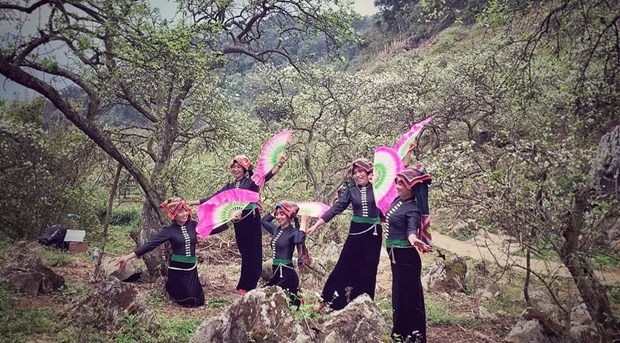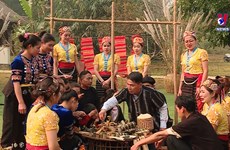Exhibition to spotlight space of gong culture, Xoe dance
Visitors will have a chance to gain an insight into the space of the gong culture in the Central Highlands and the art of Xoe dance of the Thai people, two UNESCO-recognised intangible cultural heritage elements of Vietnam, at an exhibition to be held in Hanoi on December 1, according to organisers.
 Thai ethnic women perform Xoe dance, an intangible cultural heritage of humanity. (Photo: VNA)
Thai ethnic women perform Xoe dance, an intangible cultural heritage of humanity. (Photo: VNA)The exhibition on the intangible cultural heritage in connection with tourism development in ethnic minority and mountainous areas will be held by the Vietnam National Authority of Tourism (VNAT)’s tourism information centre in response to the Vietnam Cultural Heritage Day (November 23) and also part of a project under the national target programme on socio-economic development in ethnic minority and mountainous areas in 2023, the VNAT under the Ministry of Culture, Sports and Tourism said on November 27.
Apart from displaying the two cultural heritage elements, many other activities will also take place, including introducing tourism potential and products of ethnic minority areas and offering ethnic groups’ delicacies to visitors.
On this occasion, a 30-second video clip on the intangible cultural heritage elements will be launched, giving viewers a glance at immense terraced rice fields and mountains in the northwestern region, home to the Thai ethnic group – owner of the art of Xoe dance.
Xoe, comprising movements symbolising ritual, cultural, daily, and working activities of people, is performed at ceremonies, weddings, festivals, and cultural community events. The art was inscribed on the representative list of the intangible cultural heritage of humanity on December 15, 2021.
The clip also shows off the beauty of the Central Highlands, where the space of the gong culture forms an integral part of the life of E De, Gia Rai, Ba Na, Xo Dang, Ro Mam, and Ma ethnic groups, among others. Gongs are always present in every aspect of the daily life of locals.
The space of the gong culture in the Central Highlands was recognised as a masterpiece of the oral and intangible cultural heritage of humanity on November 25, 2005.
The VNAT said cultural heritage enriches the attractiveness of destinations as it creates valuable experiences for visitors, especially international ones. It is also a strategic resource for the development of tourism and the attraction of investment to heritage tourism, helping many localities boost socio-economic development and preserve and promote cultural heritage values./.













